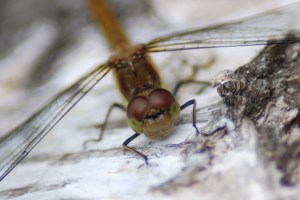All hail the newt God Salamandrus! He is kind and provides the exquisite harvest of Triturus cristatus when you least expect it, He is vengeful withholding such amphibian bounty for weeks on end whilst attempting to drown you from the above world and He is wise teaching those who follow the newty path of righteousness that ponds and all who inhabit them are fragile and need better care to be taken of them.
Please forgive my discent into newty religious nonsense but this is extent to which my brain has atrophied after nine consecutive weeks of surveying for Great Crested Newts.
I think I must have been incredibly spoiled last year with my three survey sites. This year, however, has been rather different both in number of pond sites (I lost count) and pond quality. There seemed to be a pattern that emerged this year. Even in areas where terrestrial habitat was decent runoff from highly intensive agriculture, over shading by trees, lack of good plant laying material and fish turned a number of potential amphibian strongholds into virtual wastelands. The worst scenarios were those whereby most of the ponds in the wider area were experiencing one or more of the aforementioned pressures. It was hard not to mourn for what could so easily be otherwise.
Ecologically unsympathetic agriculture has been attacked on many fronts for the decline in our wildlife and I have to admit that I’ve seen some hideous ponds that owe their facelift gone wrong to such practices. Some of my surveyed ponds were so nutrient enriched they seem to bleed (a process owing to the iron in our fertilisers) or looked like pea soup, or even worse, poop soup. Some simply looked like a fly tipping ground though no access was available for third parties to carry out such atrocities. I guess you can get away with more in your own backyard. Admittedly not all ponds were affected thusly but those that were in good condition were certainly the exception rather than the rule. The water quality of residential ponds was generally not an issue but fish certainly were. If you want your pond to have the maximum positive effect when it comes to wildlife do not put a single fish in it. They eat everything and have a particular impact on the Great Crested Newt as the efts of this newt species like to swim in the water column effectively making them fast food as far as fish are concerned.
All in all it was a good survey season and I got a load of experience both as a surveyor and team leader but I was left with a heavy heart in terms of the ponds I’d visited. The ones teaming with fish would be difficult to reclaim in the name of Salamandrus but with a little bit of help some could indeed become glorious.

 A graduate in search of her inner scientist, trees to climb, butterflies to chase, tortoises to hang out with and maybe... just maybe... a PhD.
A graduate in search of her inner scientist, trees to climb, butterflies to chase, tortoises to hang out with and maybe... just maybe... a PhD.


Posted on June 19, 2012
0